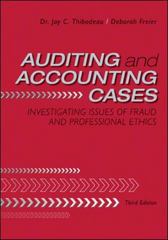Even as conditions in the telecommunications industry deteriorated in 2000 and 2001, WorldCom continued to post impressive
Question:
Even as conditions in the telecommunications industry deteriorated in 2000 and 2001, WorldCom continued to post impressive revenue numbers. In April 2000 CEO Ebbers told analysts that he “remain[ed] comfortable with . . . 13.5 to 15.5 percent revenue growth in 2000.” In February 2001 Ebbers again expressed confidence that WorldCom Group could repeat that performance:
“On the WorldCom side of the business, we are sticking with our 12 percent to 15 percent revenue growth guidance for 2001. Let me restate that. On the WorldCom side of the business, we are sticking with our 12 percent to 15 percent revenue growth guidance for 2001.”
According to several accounts, revenue growth was emphasized within World-Com; in fact, no single measure of performance received greater scrutiny. On a regular basis, the sales groups’ performances were measured against the revenue plan. At meetings held every two to three months, each sales channel manager was required to present and defend his or her sales channel’s performance against the budgeted performance.
Compensation and bonus packages for several members of senior management were also tied to double-digit revenue growth. In 2000 and 2001, for instance, three executives were eligible to receive an executive bonus only if the company achieved double-digit revenue growth over the first six months of each year.
The principal tool by which revenue performance was measured and monitored at WorldCom was the monthly revenue report (“MonRev”), prepared and distributed by the revenue reporting and accounting group (hereafter referred to as the revenue accounting group). The MonRev included dozens of spreadsheets detailing revenue data from all of the company’s channels and segments.
The full MonRev contained the Corporate Unallocated schedule, an attachment detailing adjustments made at the corporate level and generally not derived from the operating activities of WorldCom’s sales channels. WorldCom’s Chief Financial Officer and Treasurer Scott Sullivan had ultimate responsibility for the items booked on the Corporate Unallocated schedule.3 In addition to CEO Ebbers and CFO Sullivan, only a handful of employees outside the revenue accounting group regularly received the full MonRev. Most managers at WorldCom received only the portions of the MonRev that were deemed relevant to their positions. Sullivan routinely reviewed the distribution list for the full MonRev to make sure he approved of everyone on the list.4 The total amounts reported in the Corporate Unallocated schedule usually spiked during quarter-ending months, with the largest spikes occurring in those quarters when operational revenue lagged farthest behind quarterly revenue targets—the second and third quarters of 2000 and the second, third, and fourth quarters of 2001. Without the revenue that was recorded in the Corporate Unallocated account, WorldCom would have failed to achieve the double-digit growth it reported in 6 out of 12 quarters between 1999 and 2001.
Case Questions
1. Consider the principles, assumptions, and constraints of Generally Accepted Accounting Principles (GAAP). Define the revenue recognition principle and explain why it is important to users of financial statements.
2. Provide one specific example of how WorldCom violated the revenue recognition principle in this situation.
3. Consult Paragraphs .06–.07 of AU Section 319. Do you believe that WorldCom had established an effective system of internal control over financial reporting related to the revenue recorded in its financial statements?
4. Consult Paragraph 25 of PCAOB Auditing Standard No. 5 and/or AU Section 319.34. Define what is meant by control environment. Next explain why the control environment is so important to effective internal control over financial reporting at an audit client like WorldCom.
5. Explain what is meant by a top-side adjusting journal entry. If you were auditing WorldCom, what type of documentary evidence would you require to evaluate the validity and propriety of a top-side journal entry made to the revenue account?
6. Consider the roles of Ron Lomenzo and Lisa Taranto. Assuming that these employees knew that the entries being proposed by Scott Sullivan were fraudulent, do you believe that Lomenzo and Taranto should have recorded the journal entries as directed by Sullivan? Why or why not?
Step by Step Answer:

Auditing And Accounting Cases Investigating Issues Of Fraud And Professional Ethics
ISBN: 9780078110818
3rd Edition
Authors: Jay Thibodeau, Deborah Freier





